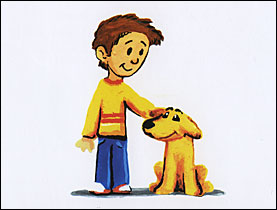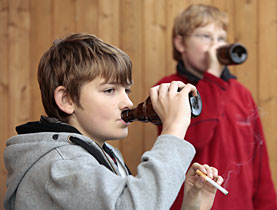Toy targets taboo

A fluffy toy dog is set to bring home an important message to the Swiss public this month: alcohol dependency shouldn't be a taboo subject, and help is available.
The dogs will be handed out to post office customers in the last two weeks of November, in a campaign organised by the Swiss Institute for the Prevention of Alcohol and Drug Problems.
The character comes from a book written specially for the organisation and aimed at children aged between five and eight.
Boby is a dog whose master, Fred, sometimes forgets to feed and pet him – and he doesn’t know why. Boby thinks he must have done something wrong to make Fred behave like this. And he is too ashamed to tell other dogs about the problem.
It’s only when his friend Felix talks about the experience of another dog and her mistress, and explains that the bottles in the dustbin show that Fred is ill, that Boby realises not only that it isn’t his fault, but also that there is hope for Fred.
The power of taboo
The SFA estimates that there are about 100,000 children with alcohol-dependent parents living in Switzerland.
The impact on these children can be devastating, director Michel Graf told a media conference in Bern on Thursday. Like Boby, they don’t understand why their parents have mood swings, are depressed or aggressive.
The problem can work itself out in different ways. Monika, who grew up with an alcoholic father and then married a man who also turned out to be alcohol-dependent, told swissinfo.ch about her experience. (As is normal in self-help groups, she is known only by her first name.)
“When I was a child the difficult relationship was with my mother. She did her best to hide my father’s drink problem, but I just experienced her as either sad or angry. She had to do so many of the things that my father should have done, and was so intent on presenting a perfect face to the outside world, that it was a real strain and she became a depressive.”
Ironically, her father was always very kind to her – “perhaps because he felt guilty”.
“As a child, I always had the feeling there was something different about our family, but I couldn’t say what it was.”
But Monika initially made “exactly the same mistakes” with her own children, she admitted. “It was only when I looked for help for myself because of problems with our marriage that I was able to start talking about it, to the children as well, and to speak openly about alcoholism as an illness.”
As Monika’s experience with her mother shows, the taboo surrounding the issue adds to the strain of living with alcohol dependency, and the Boby campaign aims to break through it.
Raising awareness
The Boby book has been distributed to crèches and kindergartens all over Switzerland, but it is partly a matter of chance whether it falls into the hands of the children who need it most.
But it is designed to raise the awareness of anyone who reads it, so they too can play the role of Felix to a child’s Boby.
That’s why the new campaign is being launched via post offices: local branches, used by most people, are seen as a good way of raising public awareness as a whole about the issue. It is also hoped that greater public understanding will help parents accept their dependence as an illness that can be treated.
A pilot project
For many years the problems faced by the children of alcohol-dependent parents were largely ignored, as Irene Abderhalden of SFA explained, and there have been very few programmes specifically aimed at them.
Although parents want to do the best for their children, it is often hard for them to admit that there is a problem. Many are afraid that if they do acknowledge it, the children may be taken away from them.
Setting up suitable support networks is no easy task and takes many years of careful work: it requires cooperation between specialists in different areas, including schools, doctors and therapists in order to reach as many children as possible.
A pilot project starts next year in the northern canton of Aargau, backed by the SFA and the Aargau Foundation for Addiction Aid. Children aged between eight and 15 will be able to attend discussion groups, and there will be courses for parents as well.
The experience will be used to feed into similar initiatives in other cantons.
No one is under any illusion that all those concerned will be reached. The SFA says that if only 20 per cent of children are brought into the project, that will be an excellent result.
Julia Slater, swissinfo.ch
The Swiss Institute for the Prevention of Alcohol and Drug Problems is a non-governmental organisation, with roots in 19th-century abstinence movements.
The Swiss Abstinence Secretariat was set up in 1902 with its headquarters in Lausanne. It took its current name in 1976.
It conducts research and has backed various popular initiatives to combat alcohol and drug dependency.
Its aim is to prevent dependency on alcohol and other drugs, and to help reduce the effects where it already exists.
It works with public and private organisations at cantonal and federal level.
More than half its funding comes from private donations and 20% from research projects it is commissioned to carry out. Another 20% comes from the sale of teaching material and services. Just under 10% comes from federal and cantonal subsidies.
According to the Swiss Institute for the Prevention of Alcohol and Drug Problems, some 100,000 children in Switzerland have at least one parent who is alcohol-dependent.
Research into the problems faced by these children only started in the German-speaking area of Europe in the 1990s.
Alcohol-dependent parents tend to create insecurity in the home, and the children lack the guidelines and structure they need in their lives.
It is estimated that about one third go on to reproduce the same problem in their own adult lives, one third suffer lesser psychological problems, such as depression, and one third are able to live normal lives.
It is not known why some children are more resilient than others; however, being able to talk about it or to have activities outside the chaos of the family probably help.
The Boby picture book was written for the Swiss Institute for the Prevention of Alcohol and Drug Problems by Marie-Claude Amacker, a special needs teacher with long experience of working with alcohol-dependents.
It is available in French and German in Switzerland.
It came out in paperback in 2006 and as a hardback in 2007, financed by donors of the institute.
The hardback version has been distributed to more than 4,000 creches, kindergartens and children’s libraries in Switzerland.
The book has also been published in Flemish in Belgium. The pictures were changed in order to adapt it to an existing campaign there.
It has also been published in English in Scotland, where Boby was renamed Rory. The Scots have used him as a basis for a range of further material, including games.

In compliance with the JTI standards
More: SWI swissinfo.ch certified by the Journalism Trust Initiative












You can find an overview of ongoing debates with our journalists here . Please join us!
If you want to start a conversation about a topic raised in this article or want to report factual errors, email us at english@swissinfo.ch.